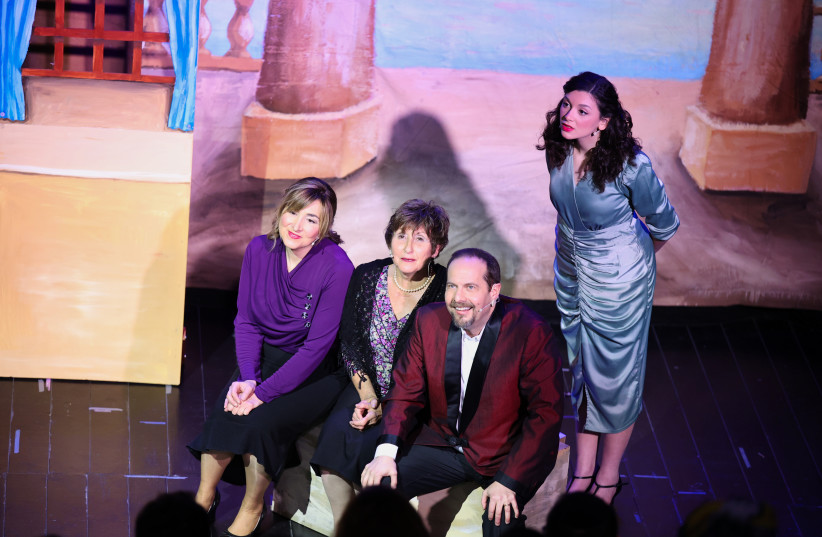
The power of theater lies in mirroring our lives but with distance to allow for some escape, too. Such was Last Night in Florence, a timely show touching on topics close to its Jerusalem audience’s current concerns: antisemitism fed by dangerous lies, to the background of impending war – but allowing for escape to 1938 Italy and the upbeat sounds of jazz.
My inaugural visit to the Davidson Theater in Jerusalem, a lovely new cultural venue in the heart of Jerusalem, was a ray of light in these difficult times. Opened in August 2021, the theater received the 2022 Israel Architects Award in the Public Building category.
The curtain rose to a backdrop of blue water and white houses. Dancers and singers in stylish outfits and hats immediately leaped into their first number, and we were transported along on a three-hour marathon of drama, intrigue, humor, and music, with a constantly changing array of gorgeous theater sets and costumes.
An ambitious play about older antisemitism
Last Night in Florence is the ambitious production of J-Town Playhouse, under the skilled leadership of director Aviella Trapido and musical director Paul Salter. It features a cast of 23 actors, singers, and dancers, a 19-strong production team, and a small orchestra. Script and lyrics were written by Daniel Taub, former Israeli ambassador to the UK, with music by Hillel Goldblum.
As a writer, I sometimes find that the plot of a musical or opera disappointingly plays second fiddle (excuse the pun) to the music. But Last Night in Florence is a plot-driven drama. While Italy of 1938 is marching all too eagerly to the drumbeat of Mussolini et al., a much older antisemitism in the person of Archbishop Sicola (played ominously by Shlomo Goren) is gradually squeezing the Jews’ freedoms through deception and manipulation.

ONE ASSIMILATED young Jewish jazz singer, Bella (Abigail Fox), finds her love life, career, and her very identity shaped by the larger historical forces of the time. Her impending engagement to the aristocratic Edoardo (Raphael Sarya Serfaty) is hindered by her supposedly close friend, Graziella (Maya Golan) – just one of several acts of betrayal in this play, whose central themes include treachery versus loyalty. Graziella, singing “One or the Other,” agonizes between her friend’s well-being and her own, and I wish we could have followed her storyline more closely as she surrenders to selfishness and then lives to rue it.
As Bella begins to discover her Jewish identity among a rather wacky group of Jews led by the mysterious “dream fixer,” Rabbi Enzo (Josh Becker), the Jews’ situation becomes increasingly dire. It eventually approaches almost a blood libel, boiling up around 10-year-old Benito (Eitan Nativ Halperin). But as a foil to the evil Sicola, we do see another priest, Father Giacomo (Robin Stamler), risk a lot to help his friend Rabbi Giuseppi (Michael Havin); this kindness and decency help restore our faith in humanity.
The figure of Rabbi Giuseppi is partially inspired by Italian rabbi and professor Umberto Cassuto, who studied the Aleppo Codex and, due to the 1938 Italian antisemitic racial laws, made aliyah and joined the Hebrew University. His biblical work features prominently in my biography of Prof. Nehama Leibowitz [Nehama Leibowitz: Teacher and Bible Scholar], so seeing this character on stage held particular interest for me personally.
Aside from the length – a few songs could have been cut, and the climactic trial scene reached earlier – and occasional first-night hiccups (careful not to trip over those boxes!), overall this was a stunning collaboration among numerous talented people. Last Night in Florence is a surprising yet refreshing hybrid of upbeat jazz with dark and difficult themes – as if urging us to find harmony and light in our current challenges as well. ■
